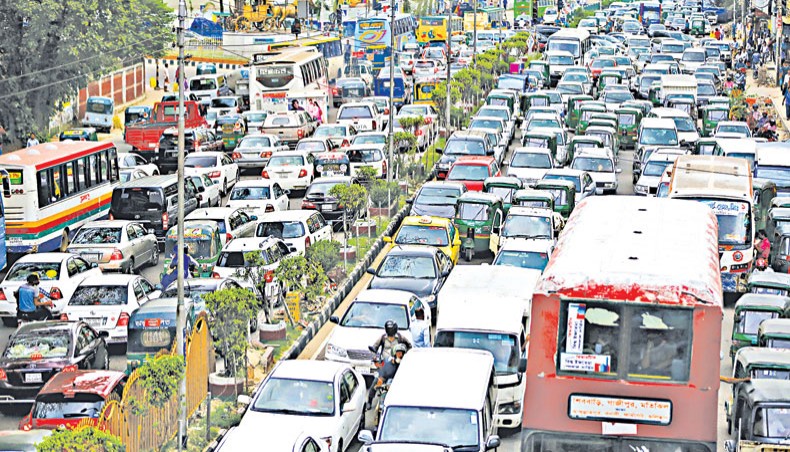Lessening Ramadan traffic overcrowding
RAMADAN, the ninth month in the lunar Hijri calendar, is knocking at our door. In Bangladesh, we see an insane traffic on the roads during Ramadan. People have to go through unbearable sufferings to catch work and other destinations in this month, which wastes away our entire day and all our plans. Because of the crazy traffic congestion, most of the important city roads often seem blocked with hundreds of vehicles stuck for hours every day. The city’s traffic system almost collapses every year as Ramadan begins.
Transport analysts have been struggling to figure out any solution to curb the overly-increasing traffic congestion. To them, it seems, the ways to reduce traffic congestion in Dhaka are only narrowing down. The traffic wing of the police says that traffic overcrowding has multiplies every Ramadan and they are unable to control so much traffic. On top of the summer’s heat, traffic congestion is seen to become more and more intolerable to citizens in Ramadan. Experts complain that none of the technical traffic plans are being successfully implemented. Also, large road infrastructure of the city is exponentially increasing the traffic problems day by day.
Apparently, it seems that all the steps for traffic management have failed so far with the traffic authorities blaming the shortage of manpower for the miserable situation. It has been experienced that it takes at least two hours to travel to any place within the city during Ramadan. In 2017, we have seen that the journey for some took more than three hours after the offices break at 3:30pm.
Mismanagement on the roads may be considered one of the contributing factors to such condition. According to expert’s observation, unplanned road digging, footpath occupation, rainfall, haphazard car parking on the roads, slow-moving rickshaws, violations of traffic rules and jaywalking are making the situation worse.
Khan Mohammad Redwan, deputy commissioner of the city police in charge of traffic once said in this regard that they have been working hard to reduce public sufferings caused by traffic congestion. He mentioned that, unfortunately, there are not enough free roads in comparison with the volume of passengers. And during Ramadan, when everyone tries to reach home at the same time, they fell helpless. They requested the shoppers to avoid the time before iftar and drivers to follow traffic rules. He urged that without the help of citizens, only the traffic department cannot improve the situation.
This year, as Ramadan is likely to begin in the middle of May, the government has already fixed office timings for the month from 9:00am to 3:30pm. A decision in this regard was made at a cabinet meeting. As per the government decision, there would be a 15-minute prayer break from 1:15pm. The new timing applies to all government, semi-government, autonomous and semi-autonomous institutions. However, the Supreme Court, banks, insurance agencies, emergency services providing organisations and other financial institutions will at liberty to decide their own working hours.
Similar kind of measure is taken every year by the government to allow all the employees to reach home in time for iftar to break their fast. However, it does not help to reduce the sufferings caused by heavy traffic
Considering the traffic situation in Ramadan in Bangladesh and possible way outs to lessen the sufferings of people caused by traffic congestion, Shahdeen Malik, advocate of the Supreme Court, thinks that staggered office timings for government, semi-government, autonomous and semi-autonomous and private bodies might work as a possible solution to the growing traffic congestion in Bangladesh in Ramadan.
The office timings for metropolitan cities like Dhaka may be staggered with a gap of one hour each. This may help to check the crowding of roads and roundabouts. There may be at least an hour window for leaving the work place between 3:00pm and 4:00pm. Adopting separate office hours will be a good option to ease peak hour rush.
For instance, office hours for government institutions may be declared to be between 9:00am and 3:30pm, and for semi-government institutions, the same may be fixed from 9:30am to 4:00pm. Banks and other commercial establishments may have office hours between 8:30am and 3:00pm and so on.
Staggering working hours in work places is bound to streamline the flow of traffic on the city roads from dusk to dawn. This system allows commuters to go for work at different times, which spreads traffic across a greater portion of weekday mornings and evenings. Besides, it will create a positive impact on reducing the number of accidents. It will also reduce the noise pollution created by the blowing of horns and good solutions to traffic control. This idea was used successfully by the city of Los Angeles in the 1984 Olympic Games.
In order to reduce traffic during rush hours, the Shanghai government has considered introduction of a staggered work hours system in 2014.
Employers can also help to ease traffic in the city during Ramadan. With the rapid development of modern communications technology, many people are now able to do their jobs without going to the office. Employers can, therefore, encourage more of their staff to work from home. According to the UK’s Office for National Statistics, more than 1.5 million people in London chose to work at home during the 2012 London Olympic Games, an alternative that greatly reduced rush hour traffic during the event in London.
Our government may, therefore, consider these solutions in future in order to minimise people’s sufferings caused by huge traffic congestion during Ramadan.
News Courtesy: www.newagebd.net











